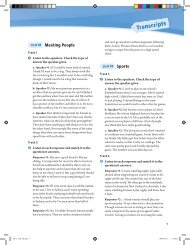Mastering Skills for the TOEFL iBT 2nd - Speaking
Mastering Skills for the TOEFL iBT 2nd - Speaking
Mastering Skills for the TOEFL iBT 2nd - Speaking
Create successful ePaper yourself
Turn your PDF publications into a flip-book with our unique Google optimized e-Paper software.
TranscriptsW: Yeah, but I’m not thrilled with <strong>the</strong> idea of havingto pack up all my stuff.M: It might be a lot of trouble. But if it means you geta good night’s sleep, it could be worth it.W: Maybe you’re right. Thanks <strong>for</strong> <strong>the</strong> advice.Question 6M: Today we’re going to discuss language divergence—how one language can diverge into multiplelanguages. It’s generally believed by linguiststhat all <strong>the</strong> languages of today originated from acommon proto-language thousands of yearsago. A proto-language is <strong>the</strong> ancestor of modernlanguages. Now, as time passed and peoplebegan to split into different tribes, this originalproto-language began to evolve independently ineach tribe. The process of language divergencehas begun. When a language begins to divergelike this, it usually goes through two key stages:first, it separates into multiple dialects, andeventually <strong>the</strong>se dialects become two or moreseparate languages.Dialects occur when one language beginsto be altered into two or more versions. Thismay occur when people of one language adaptexisting words to talk about new concepts.These alterations in language <strong>for</strong>m what areknown as dialects, different variations of <strong>the</strong> samelanguage. Now, dialects are not yet separate,different languages. They’re simply differentversions of one language. For example, compare<strong>the</strong> speech of people in <strong>the</strong> United Kingdom to<strong>the</strong> speech of Americans. They’re speaking <strong>the</strong>same language—English—but differently. Although<strong>the</strong>y pronounce words differently and use differentterminology, <strong>the</strong>y are speaking different dialectsof English.Eventually, as time elapses, dialects canbecome so dissimilar from one ano<strong>the</strong>r that <strong>the</strong>ybecome <strong>the</strong>ir own individual language. Frenchand Spanish are good illustrations of this. Each of<strong>the</strong>se languages is different from <strong>the</strong> o<strong>the</strong>r. ASpanish person would not generally understanda French person without knowing <strong>the</strong> o<strong>the</strong>r’slanguage. However, if you look attentively at bothlanguages, you’ll find that <strong>the</strong>y do have manysimilarities. This is evidence that Spanish andFrench both evolved from one common language:a proto-language. There<strong>for</strong>e, we can say thatFrench and Spanish originated from <strong>the</strong> samelanguage.Practice Test 2Question 3W: Hi, Wallace. How’s it going?M: Not so great since <strong>the</strong>y announced that <strong>the</strong>publications class was cancelled.W: Oh yeah, I heard about that—were you planningon taking it?M: Yes, I was. It was <strong>the</strong> last class I needed tograduate.W: I’m really sorry.M: Yeah. I mean, I realize that Professor Thomson ison extended leave, but I know of ano<strong>the</strong>r personthat could easily teach it.W: Oh really? Ano<strong>the</strong>r professor?M: No. Actually, it’s a <strong>for</strong>mer student of ProfessorThomson’s who took <strong>the</strong> publications class lastyear. She’s a graduate student now, but I knowshe’d make a great student teacher.W: Does she know a lot about publishing?M: She probably knows more about publishing thanmost of <strong>the</strong> professors.W: Didn’t <strong>the</strong>y say that not enough students wereinterested in <strong>the</strong> class, too?M: Yes, that was <strong>the</strong> official announcement from<strong>the</strong> committee, but I know of at least ten o<strong>the</strong>rstudents besides myself that were planning ontaking that publications class.W: That is upsetting . . . I can understand why you’reangry.M: Well, I’m hoping that if I talk to <strong>the</strong> right people, Ican convince <strong>the</strong>m to reverse <strong>the</strong>ir decision.Question 4W: There are actually a couple of physiologicaldifferences which allow male songbirds toproduce more complex songs than those offemale songbirds.First, <strong>the</strong>re’s a difference in <strong>the</strong> song-producingparts of songbird brains. It all comes down to a partcalled <strong>the</strong> robustus archisriatalis, or RA. This is anarea of <strong>the</strong> brain responsible <strong>for</strong> song productionin birds. As it turns out, <strong>the</strong> size of <strong>the</strong> RA in malesongbirds is significantly larger than those infemale songbirds. In zebra finches, <strong>the</strong> RA is atleast five times larger in males than in females. Somale birds simply have a better ability to producesongs because <strong>the</strong>y have bigger song-producingmechanisms.Transcripts 17
















